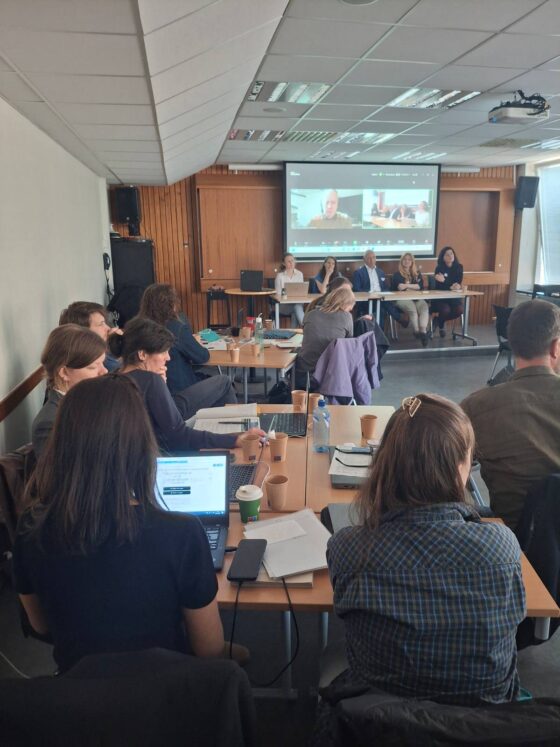
The latest workshop of the Baltic Coast Dialog project was held on 3 April in Stockholm, Sweden, and was organised by FishSec. This event marked the final of four planned workshops in the Baltic Coast Dialog project, which aims to establish a network of international stakeholders dedicated to the protection and restoration of the Baltic Sea’s marine and coastal ecosystems.
The theme of the workshop was Ecosystem Based Management and fisheries in the Baltic Sea, focusing on how the ecosystem-based approach to fisheries management can be applied at different levels, transitioning from theory to practice. The day featured both informative presentations and constructive discussions with an expert panel and workshop participants. The workshop focused on the principles, challenges, and opportunities of Ecosystem Based Management and fisheries, providing some practical examples from the Baltic Sea region. The workshop featured presentations from scientists, managers and non-governmental actors on how to operationalise EBM in the Baltic Sea. More specifically: Sara Söderström from the Baltic Sea Centre, Jean-Christophe Vandevelde from The Pew Charitable Trusts, Carolyn Faithfull from SLU/ICES, Eva Papaioannou from GEOMAR, Lars Ljunggren from the Swedish Anglers’ Association, Ellen Schagerström and Amanda Öberg from Baltic Waters, and Gustaf Almqvist from the County Administrative Board of Stockholm. Their presentations covered topics such as the tools available to decision-makers for implementing EBFM, management at the regional level, and examples of restoration efforts done in the region.
Aliki Kolovou and Niki Sporrong from the host organisation, FishSec, introduced the presenters and moderated the questions and discussions following the presentations. During the second part of the workshop, a panel discussion and dialogue were held. Below are some key discussion points, outcomes, and findings highlighted during the presentations and discussions. These will be shared among the partner organizations to inform further work on the project.
Key Discussion Points & Findings from Presentations:
Regulatory & Policy Landscape
EU Fisheries Policy and EBFM:
- The Common Fisheries Policy (CFP) Article 2.3 requires Ecosystem Based Fisheries Management (EBFM), but implementation remains weak due to political compromises (Bothnian herring quotas were, for example, set at 55,000t).
- HELCOM’s Role: While HELCOM’s EBFM working group has developed guidelines, only four Baltic species are currently in “good ecological status” according to HELCOM’s Holistic (HOLAS) assessments.
- Challenges in Fisheries Governance: Fragmented national interests and short-term economic priorities often override scientific advice. The precautionary approach is rarely applied, even for collapsed stocks like Baltic cod.
Scientific Insights & Challenges
- Over the past decade, EBFM principles such as multispecies management, and habitat protection, have gained theoretical traction but these principles still face implementation gaps. Stakeholders highlighted confusion between terms like EBM, EBFM, and EAM.
- Climate Change and Fisheries: The Biodiversa+ project “CLIMFISH” studies how warming waters affect fish distributions (e.g., cod thresholds at 16°C). Warmer temperatures may require redefining traditional stock boundaries.
- Baltic Cod Collapse: ICES data show that the eastern Baltic cod stock remains below safe biological limits. Discussions emphasized the need for ecosystem-linked reference points (e.g., “Feco“) rather than single-species MSY.
Community & Business Engagement
Fisheries and Local Livelihoods:
- The “Pike Factories” initiative (presented by the Swedish Anglers’ Association) demonstrated how restoring wetlands can revive predatory fish populations, benefiting both ecosystems and recreational fishing.
- BalticWaters’ ReCod Project: Explored restocking cod through aquaculture, with early trials showing adaptation potential. Challenges include high costs and scalability.
- Stakeholder Conflicts: Small-scale fishers expressed frustration over quotas favoring industrial fleets. The Stockholm Archipelago co-management model was presented as a way to balance ecological and economic needs.
Takeaway Messages & Action Points
For Policymakers & Environmental Organizations:
- Strengthen enforcement of CFP’s EBFM mandate through legal action (e.g., challenging quota violations).
- Support regional EBFM pilots (e.g., Stockholm Archipelago) to test co-management approaches.
- Advocate for HELCOM Baltic Sea Action Plan reforms to align fisheries with biodiversity goals.
For Scientists & Researchers:
- Develop practical EBFM metrics (e.g., “Feco“) for ICES advice.
- Prioritize studies on climate-resilient fisheries and multispecies interactions.
- Expand fisher participation in data collection (e.g., BalticWaters’ fisher surveys).
For Industry & Local Communities:
- Promote alternative livelihoods (e.g., restorative aquaculture like ReCod).
- Improve consumer awareness of sustainable Baltic seafood choices.
- Engage in regional working groups (e.g., HELCOM’s EBFM network) to voice concerns.
The outcomes from all workshops in the project are being used to generate practical solutions and strategies, which will be included in the final report. The next event in the Baltic Coast Dialog series is a concluding conference scheduled for September 2025 in Stralsund, Germany (more information to come).